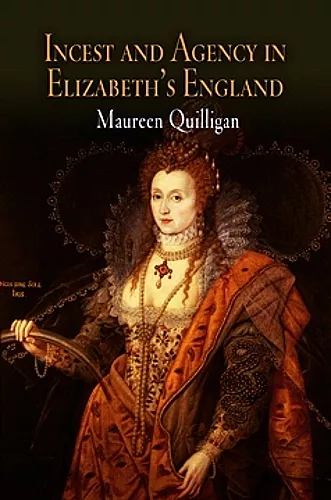Incest and Agency in Elizabeth's England
Format:Paperback
Publisher:University of Pennsylvania Press
Published:12th Apr '05
Currently unavailable, and unfortunately no date known when it will be back

In direct contrast to our modern understanding of incest, Incest and Agency in Elizabeth's England seeks to demonstrate that, during the Renaissance, a small number of important women used incest, imagined or actual, to empower their authorship.
Maureen Quilligan explores the remarkable presence in the Renaissance of what she calls "incest schemes" in the books of a small number of influential women who claimed an active female authority by writing in high canonical genres and who, even more transgressively for the time, sought publication in print.
It is no accident for Quilligan that the first printed work of Elizabeth I was a translation done at age eleven of a poem by Marguerite de Navarre, in which the notion of "holy" incest is the prevailing trope. Nor is it coincidental that Mary Wroth, author of the first sonnet cycle and prose romance by a woman printed in English, described in these an endogamous, if not legally incestuous, illegitimate relationship with her first cousin. Sir Philip Sidney and his sister, the Countess of Pembroke, translated the psalms together, and after his death she finished his work by revising it for publication; the two were the subject of rumors of incest. Isabella Whitney cast one of her most important long poems as a fictive legacy to her brother, arguably because such a relationship resonated with the power of endogamous female agency. Elizabeth Carey's closet drama about Mariam, the wife of Herod, spends important energy on the tie between sister and brother. Quilligan also reads male-authored meditations on the relationship between incest and female agency and sees a far different Cordelia, Britomart, and Eve from what traditional scholarship has heretofore envisioned.
Incest and Agency in Elizabeth's England makes a signal contribution to the conversation about female agency in the early modern period. While contemporary anthropological theory deeply informs her understanding of why some Renaissance women writers wrote as they did, Quilligan offers an important corrective to modern theorizing that is grounded in the historical texts themselves.
"Quilligan writes a history of women's authorship that honors the filiation among women without being exclusively feminine, in that she takes into account significant male contributors to the 'female line.' Her work effectively combines sophisticated theory with a keen eye for historical detail to show how women authors of the period consolidated their authority as writers through the use of incestuous motifs." * Leah Marcus, Vanderbilt University *
"Quilligan draws theory from anthropology and French feminism, and detail from history. While her contention that incest (broadly defined) often empowers women as authors may be surprising, her argument is convincing-and she crowns it with a reading of Elizabeth I's own part in this." * Times Literary Supplement *
ISBN: 9780812219050
Dimensions: unknown
Weight: unknown
296 pages